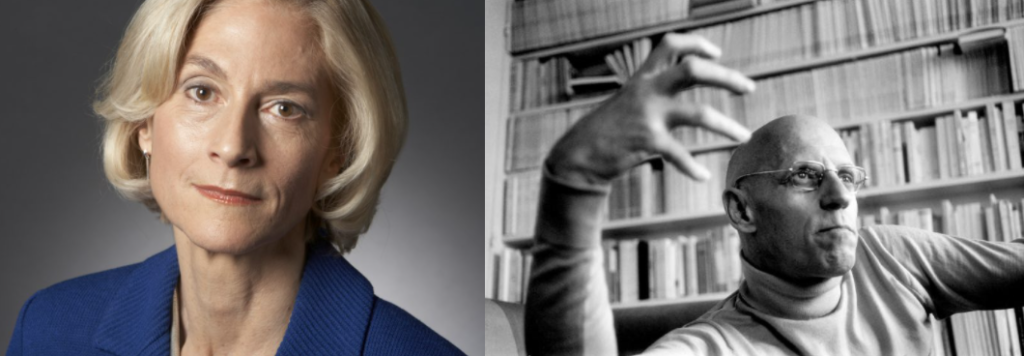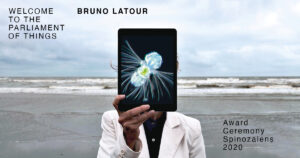Michel Foucault laureate of 2021
Next year, the American philosopher Martha Nussbaum will be honored with the Spinozalens 2022. This was announced on 24 November 2021 by Prof. Jet Bussemaker, chairwoman of the jury and former Dutch Minister of Education, Culture, and Science. Nussbaum will be honored for her contribution to ethical reflections on the theme of health, risk, and society. As always, the members of the Spinozalens jury also chose to honor a historical thinker as a laureate for 2021: the French philosopher Michel Foucault. He will be honored with educational material, which will be released at the beginning of 2022.

The names of the laureates were revealed during an online meeting on November 24, which was recorded in The Amare Theater in The Hague in the presence of Mayor Jan van Zanen.
Fragility and capabilities
In its report, the jury praises Martha Nussbaum (1947) as an original and eminent thinker. She discusses a broad range of topics that are extremely relevant to the public discussion of healthcare and the (global) distribution issues that come with it. Throughout her work, Nussbaum uses both Western and Eastern sources and gives much attention to the contrasts between North and South, which has inspired wildly different audiences.
Two books stand out in this regard. Creating Capabilities: The Human Development Approach (2011) is hugely important due to the substantial theories about social justice that Nussbaum deals with. Those theories perfectly fit the complex problems we are facing from globalization in general and the pandemic in particular. Of equal importance is her earlier book The Fragility of Goodness (1986, revised edition 2001), partly because it takes into account the vulnerability and powerlessness associated with these complex issues.
Martha Nussbaum will receive the Spinozalens during a public event on November 17th, 2022 in The Hague. In the run-up to this ceremony, the board of the International Spinoza Award Foundation will organize a design competition for young people in the Netherlands and Flanders. The competition will invite them to reflect on the future of vulnerable youngsters in society from the perspective of Nusbaum’s theory of capabilities.
Biopolitics
In the light of the Covid pandemic, the jury of the Spinozalens finds the work of Michel Foucault (1926-1984) to be more relevant than ever. Foucault came from a family of doctors, but during his studies, his attention shifted from medicine to philosophy. Health and healthcare remained central themes of his work, however, and in the final years of his life, he dedicated a great deal of attention to self-care.
Analyses of Foucault’s work were already circulating at the start of the pandemic, in particular, because he had written about other pandemics, such as the Black Death and smallpox, and the quarantines, hygiene, vaccines, and population policies that accompany them. Key themes in his work include biopolitics, normality, and surveillance.
At the time Foucault’s work came out, most members of the jury considered his work to be mind-blowing. At the same time, however, the jury notes that his epigones often too readily invoke his work to lend weight to their (provocative) positions, which therefore makes bringing his work to the fore in a responsible way difficult.
The board of the International Spinoza Award Foundation honours Foucault with a short educational video about his concept of biopolitics. The video was made by the two young philosophers Tjesse Riemersma and Jesse Havinga and was released during the online meeting. Riemersma and Havinga are developing instructions for teachers and assignments for pupils and students aged 16 years and older. Along with the video, the material will be released at the beginning of 2022 and will be available on www.spinozelens.nl. It can be used for several subjects, such as social sciences, civic education, religion, and philosophy.




